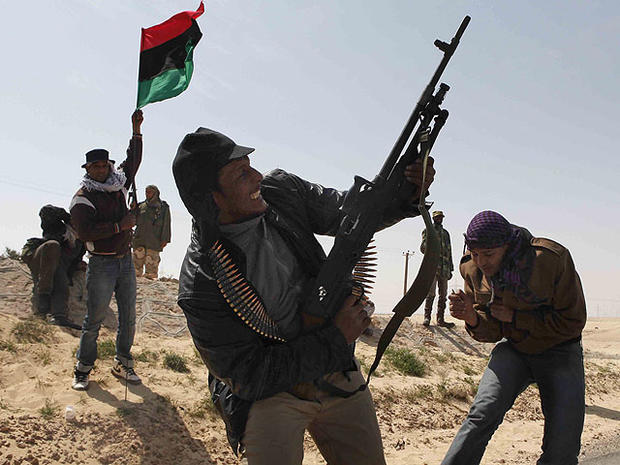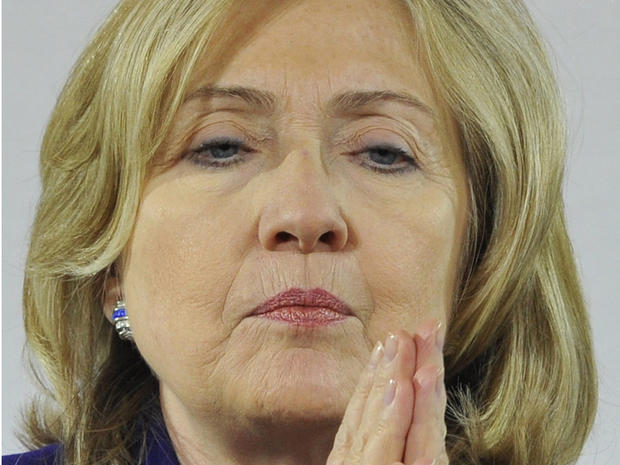Obama, allies must decide on arming Libya rebels
LONDON - Libya's rebels have been badly beaten back over the past two days by a far better-armed force backing Col. Muammar Qaddafi. They have lost the momentum gained over the weekend under cover of fierce NATO bombing against Qaddafi's military hardware.
Now, President Obama is being forced to grapple with a decision on whether to provide the rag-tag rebels with U.S. weaponry -- a decision which could quickly divide the cautious international military coalition operating over and around Libya, and could even backfire in more dramatic fashion further down the road.
NATO's top commander conceded Tuesday that there were "flickers" of al Qaeda and Hezbollah amongst the rebels fighting on the ground. The fighters' long-term interests in seeing democracy rise in the north African nation remain questionable.
President Obama told CBS News in an interview aired Tuesday night that the few rebel leaders American officials have met were "fully vetted, so we have a clear sense of who they are, and so far they're saying the right things, and most of them are professionals, lawyers, doctors, people who appear to be credible."
Obama on U.S. strategy in Libya
Obama: Qaddafi's "days are numbered"
Complete coverage: Anger in the Arab World
With historical perspective, one might ask how "vetted" and "credible" the rebels in Afghanistan appeared to the U.S. government which armed them against the occupying Soviet forces in the 1980s. Those rebels, known as the Mujahideen, became the Taliban and al Qaeda-linked militants presently fighting U.S. forces in Afghanistan.
Mr. Obama acknowledged in the interview with CBS News' Erica Hill that, just because some of Libya's rebel leaders seem legitimate, "that doesn't mean that all the people, among all the people who opposed Qaddafi, there might not be elements that are unfriendly to the United States and our interests. That's why I think it's important for us not to jump in with both feet."
What the President would not say, however, is what one foot in Libya will look like in the coming days and weeks. Mr. Obama never ruled out the possibility of arming the rebels.
Secretary of State Hillary Rodham Clinton, meanwhile, told reporters in London at an international strategy session on Libya that America's "interpretation" of the most recent United Nation's mandate on the Libya conflict was that it made arming the rebels legal.
"It is our interpretation that (UN Security Council Resolution) 1973 amended or overrode the absolute prohibition of arms to Libya," she said. In the U.S. view, an outside nation might now legally arm the rebels, if the decision was made to do so.
Other nations and partners in the military coalition have been far more guarded about the prospect of handing weapons to Qaddafi's opponents.
NATO Secretary-General Anders Fogh Rasmussen said Tuesday that the current UN mandate, "requests the enforcement of an arms embargo... We are there to protect people, not to arm people."
Diplomats: We didn't discuss arming rebels
French Foreign Minister Alain Juppe also took a different view to Clinton's of Security Council Resolution 1973, saying France was prepared to discuss arming the rebels, but that actually doing it would require a new, expanded UN mandate.
"I remind you that this is not what is envisaged by Resolution 1973," said Juppe, according to the BBC. "For the moment France has agreed to the strict application of these resolutions."
British Foreign Minister William Hague took a slightly less cautious line, suggesting a "very limited" supply of weapons to some anti-Qaddafi forces may be permissible under the auspices of Resolution 1973, but that Britain was not currently planning to provide weapons "in any form".
The bottom line, if one is discernable at this stage, is that the door has been left open by the U.S. and at least one of its key allies -- and others, seemingly, with the caveat of a hypothetical new UN resolution -- to arming Libya's rebels.
The rebels, for their part, have said they're most interested in political recognition and support, but they'd take weapons if offered.
Mahmoud Shammam, a rebel spokesman, tells The New York Times they would have beaten Qaddafi's forces already if they were better armed. "We ask for political support more than arms, but if we have both, that would be good."
What appears certain is that without some form of further material assistance, be it a resumption of heavy air strikes against Qaddafi's forces or a supply of weapons, the rebels seem unlikely to advance and more likely to be beaten back further.
The Obama administration has already picked sides in this civil war, the question is whether Mr. Obama will pick up the nation's other foot and stick it into the hornet's nest.


